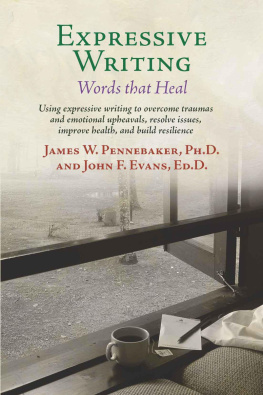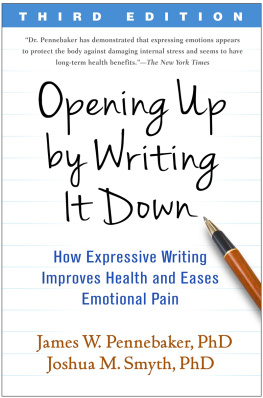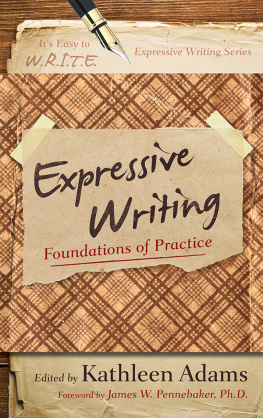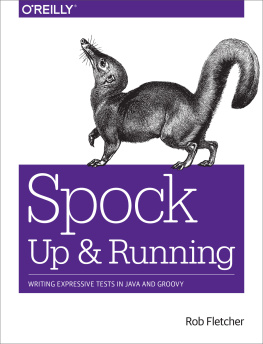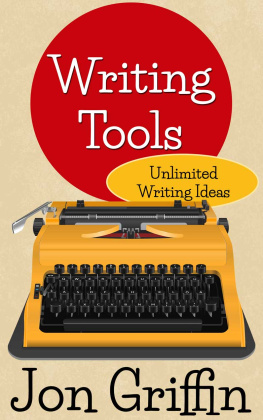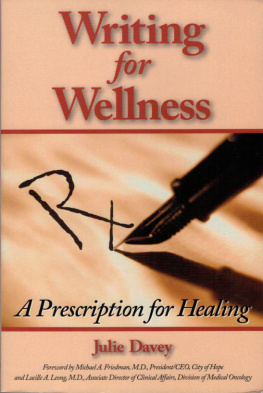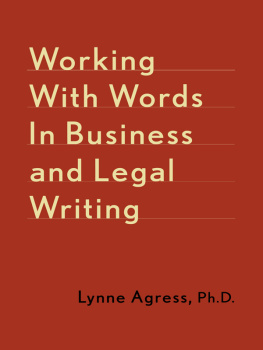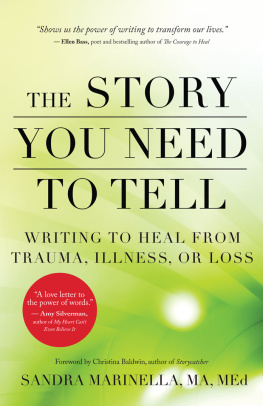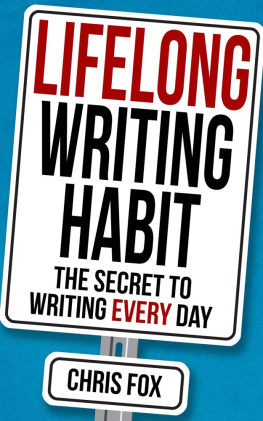Expressive Writing
Words that Heal
James W. Pennebaker, Ph.D.
Professor of Psychology
The University of Texas at Austin
and
John F. Evans, Ed.D.
Integrative Health Coach
Wellness & Writing Connections
Idyll Arbor, Incorporated
39129 264 th Ave SE, Enumclaw, WA 98022
360-825-7797, sales@idyllarbor.com
www.IdyllArbor.com
Idyll Arbor, Inc. Editor: JoAnne Dyer
2014 Idyll Arbor, Inc.
International copyright protection is reserved under Universal Copyright Convention and bilateral copyright relations of the USA. All rights reserved, which includes the right to reproduce this book or any portions thereof in any form whatsoever except as provided below and by the relevant copyright laws.
ISBN 9781611580464 paper
ISBN 9781611580471 ebook
This ebook is licensed for your personal use only. This ebook may not be resold or given away to other people. If you would like to share this book with another person, please purchase an additional copy for each person you share it with. If you are reading this book and did not purchase it, or it was not purchased for your use only, then you should return to Smashwords.com and purchase your own copy. Thank you for respecting the hard work of this author and publisher.
Correspondence should be sent to
James Pennebaker, Department of Psychology A8000, The University of Texas, Austin, TX 78712 (email: Pennebaker@mail.utexas.edu)
or
John Evans, Wellness & Writing Connections, 1516 Great Ridge Parkway, Chapel Hill, NC 27516 (email: info@wellnessandwritingconnections.com)
Salvation from THE BIG SEA by Langston Hughes. Copyright 1940 by Langston Hughes. Copyright renewed 1968 by Arna Bontemps and George Houston Bass. Reprinted by permission of Hill and Wang, a division of Farrar, Straus and Giroux, LLC. Reprinted by permission of Harold Ober Associates Incorporated.
Library of Congress Cataloging-in-Publication Data
Pennebaker, James W.
Expressive writing : words that heal / James W. Pennebaker, Ph.D., professor of psychology, The University of Texas at Austin, and John F. Evans, Ed.D., integrative health coach, Wellness & Writing Connections.
pages cm
Includes bibliographical references.
ISBN 978-1-61158-046-4 (trade paper) -- ISBN 978-1-61158-047-1 (e-book)
1. Diaries--Therapeutic use. 2. Diaries--Authorship--Psychological aspects. 3. Writing--Psychological aspects. I. Evans, John Frank. II. Title. III. Title: Words that heal.
RC489.D5P46 2014
616.89'1656--dc23
2013050169
Contents
Writing saved my life. From best-selling authors to private journal keepers, from students entering college to soldiers returning home after deployment, from those who recently lost a loved one to those who suffer from childhood violence, we hear how writing saves lives. Ive said the same thing myself.
Writing has helped me deal with my own health challenges, including PTSD, a diagnosis of advanced cancer, and a recent cancer recurrence. In fact, this book might not exist had I not come across the first edition of James Pennebakers Writing to Heal ten years ago. Learning about personal and expressive writing helped me regain my health and live a more happy and productive life.
When Writing to Heal was published in 2004, it was the first journaling book that was rooted firmly in scientific research. What drew me to it was my own need for healing, my hope that after all my years of teaching and studying academic writing that I might find something that would allow me to write my way out of a serious depression.
After reading just a few pages, I discovered why my own writing hadnt been helping me. I was stuck in a never-ending cycle of rumination telling the same story over and over. There was no arc in my story; it was a flat line. Then when my story arc turned starkly downward, I knew it was killing me from the inside. Writing to Heal explained why I needed to write a new story in a new way.
Pennebakers book provided me a way to work out the most troubling events in my life, but in a way I had never done before. The writing assignments provided a life-course correction by helping me bring closure to painful childhood memories, recall experiences from my youth with a more positive perspective, and get beyond the emotional turmoil from my own adult mistakes.
Writing to Heal also opened up new professional interests and opportunities. I began to work with a local therapist to lead her clients in writing to heal group sessions. As my writing to heal practice grew, so did my desire to bring other like-minded professionals together. In 2007, I created Wellness & Writing Connections, LLC and the Wellness & Writing Connections Conference series so counselors, healthcare professionals, educators, and others could share how they were using writing with their clients, patients, and students.
Over the next four years, several hundred healthcare professionals, counselors, educators, and others interested in writing to heal came together at the Wellness & Writing Connections Conferences in Atlanta. Studying over a hundred concurrent conference sessions, I identified guiding principles and defining characteristics in the types of exercises presented at the conferences. From these findings and from studying my clients responses in workshops and clinical settings, I developed several writing to heal programs, like Transform Your Health: Write to Heal in Part III of this book.
Through all of this, I developed an easy friendship with James Pennebaker, or Jamie, as he likes to be called. When Jamie and I gave a talk and workshop on Writing to Heal at Duke Integrative Medicine in March 2012, I learned that Writing to Heal was out of print. I offered to help update, revise, and enlarge it so it could be available again. Jamie agreed and we made plans to collaborate on this project.
This book is the result of our collaboration. We agree that it brings together clinical and scientific perspectives that can help people learn more about the process of writing and move towards better health physically and emotionally.
John F. Evans
Chapel Hill, NC
If you are currently living with a trauma or emotional upheaval, you have made a courageous step by opening this book. You may be seeking a way to deal with this event so that you can get on with your life. Its tempting to avoid thinking about the trauma altogether and pretend that everything is fine. Some of your closest friends might want you to do this as well. In reality, though, you cant ignore a massive upheaval that is probably affecting every part of your life.
This book was written for people living with a trauma or an emotional upheaval. It may have occurred in the distant past, or you may be in the middle of it right now. It could be a single event or a long-term chronic problem. Whatever it is, you probably find yourself thinking, worrying, even dreaming about it far too much. Hopefully, some form of expressive writing, as described in this book, can help you get through some of the conflict, stress, or pain that you are feeling.
Dozens of workbooks, workshops, and self-help systems are available to help you deal with emotional upheavals. Some may be beneficial for you; others may not. Most have been developed by people who work with clients on a day-to-day basis. Im not one of those people. Im a research psychologist who accidentally discovered the power of writing in an experiment I conducted in the mid-1980s. In the study, people were asked to write for four consecutive days, fifteen minutes per day, about either a traumatic experience or a superficial event. To my surprise, those who wrote about traumas went to the doctor less often in the following months, and many said their writing changed their lives. Ever since then, Ive been devoted to understanding the mysteries of emotional writing.

